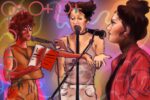“I’ve loved poetry since I was a little girl.” So begins the conversation I had with Dr. Martha Nell Smith, a professor of English at University of Maryland and the Executive Director of the Dickinson Electronic Archives. We sat down over Zoom one sunny afternoon to talk about one of Smith’s lifelong passions: poetry. But there was a twist.
I didn’t want to simply talk about poetry as a genre, I wanted to know about the application of poetry during the pandemic. Smith has been using poetry to console, inspire and carry herself through the months of lockdown. Over the course of our conversation, she shared with me a multitude of poets who she has found herself turning to during this trying time.
We began with Smith’s personal relationship to poetry. Smith recounted, “I was exposed to some Emily Dickinson poems when I was quite young, and I always thought, ‘Man! She is really weird and I like her.’ And then when I got a little older, her poems almost began to feel like math problems.” I was perplexed. Poetry seemed to me the antithesis of math. Yet, the further Smith explained, the more it dawned on me how correct she was. Just like with math, every word, letter and symbol in poetry counts. Nothing is done without purpose. It can be straightforward, and yet at the same time, intensely complex.
Our lives have become markedly more interior. That, too, is both straightforward and complex. All we need to do is stay inside. So why can it feel at times like the hardest thing to do? With the onset of the cold winter months, and a virus spreading chaos outside, it is no wonder that thousands have turned to the pages of books as a means to escape — at least for a little while. Smith quickly began to rattle off names of the poets she has been reading during lockdown. “I have found myself reading more,” she states. “One of the first poems I turned to when I realized we were going to be on a long lockdown was Dickinson’s “A Prison Gets to Be a Friend.“
Professor Smith’s long-time favorites — Emily Dickinson of course making the list — haven’t been her sole companions during the pandemic, though. “I found myself reading someone I became fascinated with 10, maybe 20 years ago. Rafael Campo — a doctor but also a poet,” says Smith. She told me of a particular poem he wrote titled, “Ten Patients, And Another.” Smith explains, “In reading about doctors I thought of Campo and this poem.”
Of caretaking, and the sacrifices many of us have made to lend a helping hand to others, Smith reads Essex Hemphill. “I did find myself going back to some AIDS poetry that I teach periodically,” Smith tells me. “I’m a big fan of Essex Hemphill, who’s no longer with us. He died of AIDS about 20 years ago.” Professor Smith recommends Hemphill’s poem, “When My Brother Fell.“
Poetry is universal. My conversation with this preeminent Emily Dickinson scholar simply confirmed it. Globally, we are searching for ways to make and keep connections with other human beings. Poetry can be that connection, can foster understanding between strangers. There are countless works waiting to be read.
Looking for more recommendations? This list from NPR focuses on “Keeping the Dark at Bay.” This one from Buzzfeed lists all the recently released and absolutely necessary works of poetry to read in 2020. Mass Poetry, an organization dedicated to the support of poetry readers and writers in Massachusetts, compiled a list of resources for poetry readers during the pandemic.

















